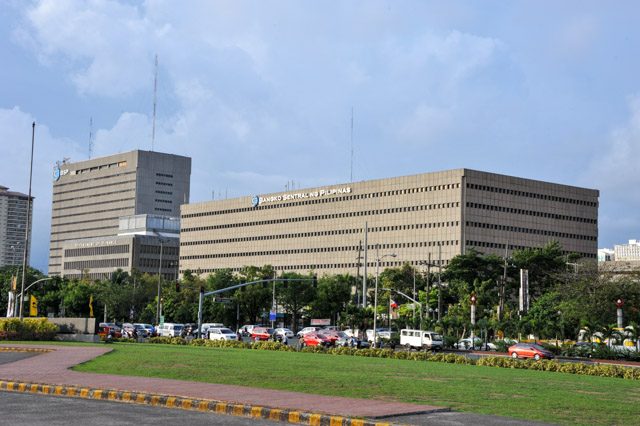SUMMARY
This is AI generated summarization, which may have errors. For context, always refer to the full article.

MANILA, Philippines – The Bangko Sentral ng Pilipinas (BSP) on Thursday, September 24, again kept policy rates unchanged in anticipation of an inflation rate that’s lower than targeted this year.
This was the 8th straight policy-setting meeting since October 2014 that the BSP’s Monetary Board has kept interest rates unchanged.
BSP Governor Amando Tetangco Jr. said the central bank’s Monetary Board decided to keep the overnight borrowing rate or Reverse Repurchase Facility (RRP) at 4% and the overnight lending rate or Repurchase Facility (RP) at 6%.
RRP is the interest rate on the RP transaction, typically contracted between the BSP and banks. RRPs may also have overnight or term maturities.
The central bank also maintained the interest rates on term reverse repurchase facility, repurchase facility, as well as special deposit accounts.
The BSP chief added that the reserve requirement ratios for banks were maintained.
The special deposit accounts (SDAs) or fixed-term deposits by banks and trust entities of BSP-supervised financial institutions were also kept steady.
RRP, RPs, and SDAs’ interest rates also remain unchanged. The reserve requirement ratios for banks were also maintained.
Standard Chartered Bank said earlier this week that BSP would likely to keep interest rates steady in line with the US Federal Reserve (US Fed) decision to keep its near zero policy rates unchanged in its meeting on September 17.
“As monetary conditions remain tight, we think the BSP can afford to delay rate hikes. The BSP is likely to gauge the market reaction to the US Fed’s policy rate decision before making a move,” said Jeff Ng, regional economist for Asia of Standard Chartered Bank.
If the US raised interest rates, it may buoy demand and drive exports and services industry considering the Philippines’ ties with the US, BSP Deputy Governor Diwa Guinigundo earlier said.
The BSP’s Monetary Board raised interest rates by 50 basis points in 2014, setting the overnight borrowing rate at 4% and the overnight lending rate at 6%, as well as and upped the reserve requirements for banks last year. The move was done to siphon off excess liquidity in the financial system.
Developments such as the US Fed’s decision on interest rates are among the major factors BSP considers in revisiting its key monetary policy settings.
The need for monetary stimulus was also lowered by a brigther prospect of 6.3% gross domestic prodiuct growth for 2016, unchanged from Asian Development Bank’s earlier projection. (READ: PH economy still a bright spot in Asia – ADB)
Lowered
Inflation expectations also remain anchored within the inflation target band over the policy horizon.
The BSP chief added monetary authorities considered the weakness in the global economy and the uncertainty in the global financial markets.
But domestic demand conditions remain firm, supported by buoyant business, consumer sentiment and ample domestic liquidity.
“Given these considerations, the Monetary Board believes that the benign inflation outlook and the economy’s underlying growth momentum provide ample room to keep monetary policy settings unchanged at this time,” he added.
Guinigundo said inflation forecast has been lowered further to 1.6% instead of the previous projection of 1.8% because of lower prices of oil and food.
Inflation eased to a new record low of 0.6% in August from 0.8 % in July, bringing average inflation to 1.9% in the first 8 months of the year on the back of easing food prices.
The BSP sees inflation averaging between 2% and 4% this year.
The central bank also raised its inflation forecast to 2.6% instead of 2.5% for next year and to 3% instead of 2.6% for 2017 because of the El Niño dry weather conditions.
Guinigundo said the government has also already undertaken a number of initiatives to address and mitigate the expected impact of El Niño on the agriculture sector.
“Any additional risks from the dry weather conditions would significantly affect the balance of risks,” he said. – Rappler.com
Add a comment
How does this make you feel?
There are no comments yet. Add your comment to start the conversation.